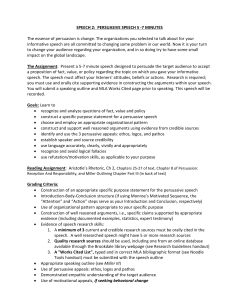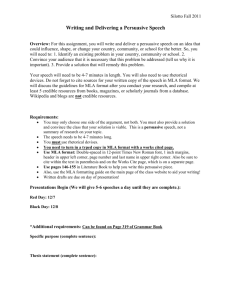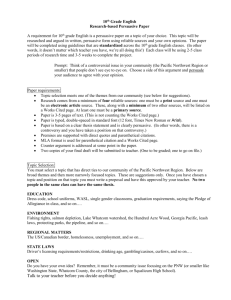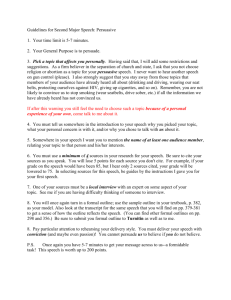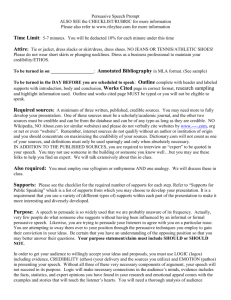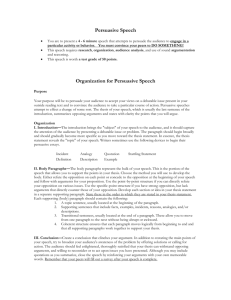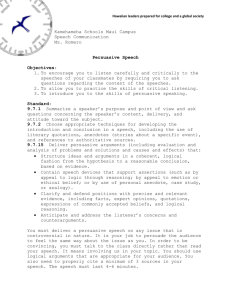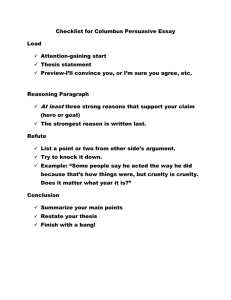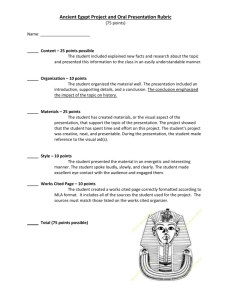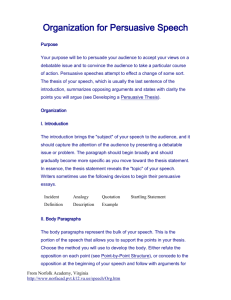Persuasive Speech Guidelines
advertisement
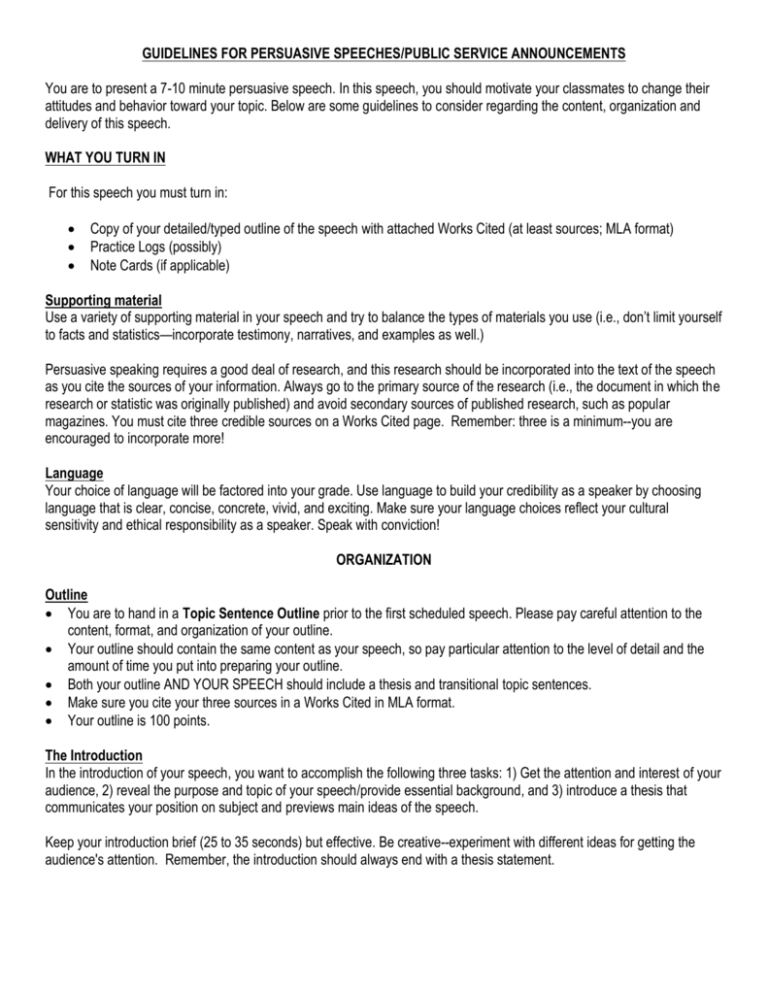
GUIDELINES FOR PERSUASIVE SPEECHES/PUBLIC SERVICE ANNOUNCEMENTS You are to present a 7-10 minute persuasive speech. In this speech, you should motivate your classmates to change their attitudes and behavior toward your topic. Below are some guidelines to consider regarding the content, organization and delivery of this speech. WHAT YOU TURN IN For this speech you must turn in: Copy of your detailed/typed outline of the speech with attached Works Cited (at least sources; MLA format) Practice Logs (possibly) Note Cards (if applicable) Supporting material Use a variety of supporting material in your speech and try to balance the types of materials you use (i.e., don’t limit yourself to facts and statistics—incorporate testimony, narratives, and examples as well.) Persuasive speaking requires a good deal of research, and this research should be incorporated into the text of the speech as you cite the sources of your information. Always go to the primary source of the research (i.e., the document in which the research or statistic was originally published) and avoid secondary sources of published research, such as popular magazines. You must cite three credible sources on a Works Cited page. Remember: three is a minimum--you are encouraged to incorporate more! Language Your choice of language will be factored into your grade. Use language to build your credibility as a speaker by choosing language that is clear, concise, concrete, vivid, and exciting. Make sure your language choices reflect your cultural sensitivity and ethical responsibility as a speaker. Speak with conviction! ORGANIZATION Outline You are to hand in a Topic Sentence Outline prior to the first scheduled speech. Please pay careful attention to the content, format, and organization of your outline. Your outline should contain the same content as your speech, so pay particular attention to the level of detail and the amount of time you put into preparing your outline. Both your outline AND YOUR SPEECH should include a thesis and transitional topic sentences. Make sure you cite your three sources in a Works Cited in MLA format. Your outline is 100 points. The Introduction In the introduction of your speech, you want to accomplish the following three tasks: 1) Get the attention and interest of your audience, 2) reveal the purpose and topic of your speech/provide essential background, and 3) introduce a thesis that communicates your position on subject and previews main ideas of the speech. Keep your introduction brief (25 to 35 seconds) but effective. Be creative--experiment with different ideas for getting the audience's attention. Remember, the introduction should always end with a thesis statement. The Body The main ideas of your speech should be clearly and concisely stated and organized. Easily identifiable supporting points should develop each of your main ideas. Make clear transitions to alert the audience when you are moving from one main idea to the next. I’m giving you some choice with the structure of your body: Option 1: Merely present very compelling arguments to convince audience of your position on your topic. Option 2: Early in the speech (first part of body), present the opposition’s overall argument. Present it, but don’t develop it fully. Then, emphatically dispute that argument by pointing out the error in that thinking and presenting compelling arguments to convince audience of your position on your topic. Option 3: Adopt a point counterpoint format, raising one of the opposition’s arguments then disputing it, raising a second of the opposition’s argument then disputing it, etc. You may also raise arguments that are not counterpoints, just use clear and helpful transitions. The Conclusion In the conclusion of your speech, you want to accomplish the following three tasks: 1) Alert the audience that the speech is ending by making a general statement about your position on this topic 2) summarize your main ideas, and 3) motivate your audience to act- either in the true “action” form or to alter their ways of thinking. After you finish speaking, pause briefly before asking your audience if there are any questions--do not just run back to your desk because you are glad to be done. YOU ARE STILL BEING GRADED DURING THE Q/A SESSION! So, don’t lapse into verbal pauses, mumbled speech, etc. Visual Aids You are required to create a PowerPoint to assist the audience in the organizing/understand of your presentations. The following is required: An INTRODUCTION slide (labeled as such) A slide for EACH MAIN IDEA (labeled according to the language next to the roman numerals of the outline) A CONCLUSION slide (labeled as such) You are permitted to (but not required to) add ANY additional slides between these requirements (i.e. slides on supporting ideas, pictures, brief video clips, etc.) DELIVERY Style Delivery is of the utmost importance in persuasive speaking. If you are not perceived as trustworthy, knowledgeable, and interesting, your topic will be dismissed by the audience. Work on creating a dynamic, energized, and enthusiastic delivery style for this speech. You will be speaking extemporaneously using a key word outline on note cards. You will be graded on how well you communicate directly with the audience. The following will also be taken into account: animatedness and enthusiasm, physical groundedness, eye contact with audience, voice (speed, volume, vocal variety), professional appearance, distracting verbals/nonverbal, and projected confidence and credibility. Speaker’s Notes You MAY use index cards, but only put key words or phrases on them. The most important quality of your delivery is that you communicate conversationally with the audience, using good eye contact. If your notes are too detailed, you may have a hard time doing this. You will be required to turn in your speaking notes at the end of your speech. Rehearsal REHEARSE, REHEARSE, REHEARSE! Make sure you practice this speech OUT LOUD! Practice it as you truly plan to deliver it! It is imperative that you start rehearsing this speech early, since it may be the most difficult of the presentations you will give. You may be required to rehearse with a rehearsal partner (in class) before you speak and with an outside partner. You should take a page of notes as you listen to a partner’s speech and give them the most honest and helpful feedback possible.
